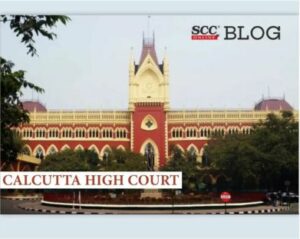Calcutta High Court: In a landmark judgement discussing the grounds on which transfer of assessment records/jurisdiction can be challenged under S. 127 of the Income Tax Act, 1961(the Act), Shekhar B. Saraf*, J., upheld that order of transfer of proceedings by Income Tax Department against the petitioner, Mr. Kamal Nath from Kolkata to New Delhi.
Factual Matrix
In the present matter, a search and survey operation were conducted on ‘involved persons' at Kolkata, Indore, Bhopal and other places by the Investigation Wing, Delhi in which several transactions of large-scale collection of illegal money were found indicating that the petitioner is involved.
The Income Tax Department issued show-cause notice dated 11-01-2022 with the proposal to transfer the petitioner's case to New Delhi. The Principal Commissioner of Income Tax after considering relation between involved person and the petitioner, documents/evidence found, suspicious cash transaction linking the petitioner, other linking factors and the Income Tax Department's plea that they desired to centralize the assessment of the petitioner for the purposes of coordinated deep investigation, verifications, consequent assessment and administrative convenience, the passed an order dated 23-02-2022 transferring the petitioner's income tax assessment from Kolkata to New Delhi under S. 127 of the Act.
Aggrieved by the impugned order passed by Principal Commissioner of Income Tax, the petitioner filed the instant petition challenging the same before this Court.
Petitioner's Contention
The petitioner contended that the petitioner only knows two involved persons and their relationship was devoid of any financial nexus therefore there is no live link of the petitioner with the involved persons. Moreover, there exists no link for attributing the incriminating and suspicious materials to the petitioner's personal income tax assessment.
Relying on Rajesh Mahajan v. CIT, 2002 SCC OnLine P & H 1533, the petitioner contended that there must be a financial nexus with the involved persons and mere speculation/apprehension, though bona fide, cannot be sufficient grounds for transfer under S. 127 of the Act.
The petitioner contended that the transfer is based on extraneous materials as the search or survey was not conducted on the petitioner and no incriminating documents were found with the petitioner which would require any coordinated investigation by the authorities. The petitioner further contended that the transfer based on vague pleas of ‘coordinated investigation' is wholly arbitrary, unreasonable and in violation of Arts. 14 and 19(1)(g) of the Constitution.
Respondent's Contention
The respondent contended that the petitioner was granted sufficient opportunity to being heard and the transfer order passed only after having found a nexus between the petitioner and the involved persons and following the due procedure and principles established in law.
The respondent contended that the petitioner has a residence in Delhi, has two bank accounts in Delhi, his entire work revolves around the cities of Bhopal and Delhi, therefore, if such transfer is made, no prejudice will be caused to the petitioner.
The respondent further contended that the nexus is well established to justify the transfer under S. 127 of the Act and the entire reality can only be discovered by way of a centralised and effective investigation.
Moot Point
What are the grounds on which transfer of assessment records/jurisdiction can be challenged u/s 127 of the Income Tax Act, 1961?
Observation
Relying on principles emerged in authorities cited, the Court opined that
“A. There is no absolute right to be assessed in a particular territory.
B. In a transfer order, the inconvenience of assessees is balanced against the right of the revenue to carry out effective tax collection (which is public interest).
C. The assessee does not possess the right to choose his/her to assess authority.
D. The scope of judicial review is limited to determining:
-
whether the decision-making process was proper, which is to ascertain:
-
if the principles of natural justice were followed, and
-
the requirements of Section 127 were fulfilled,
-
whether the reasons are not wholly irrelevant/ arbitrary,
-
whether the order is passed without jurisdiction or actuated by mala fide, and
-
whether there is any nexus of the assessee, whose assessment is being transferred, with the incriminating material and/or persons on whom incriminating material has been found.”
Decision
The Court held that the petitioner's inconvenience cannot be weighed more than ‘revenue interest' and stated
“The petitioner is a highly influential person with significant presence in Delhi including an official residence and bank accounts. While his inconvenience would have anyway been overshadowed by the revenue interest in the facts of this case, it would be pertinent to mention the lack of any inconvenience whatsoever.”
Dismissing the writ petition and upholding the transfer, the Court held that the tax authorities have followed the due procedure and are directed to complete the assessment of the petitioner within the time frame allowed in accordance with law.
[Kamal Nath v. CIT, 2023 SCC OnLine Cal 51, decided on 06-01-2023]
*Judgment by Justice Shekhar B. Saraf
Advocates who appeared in this case :
Dr. A. M. Singhvi and Mr. J. P. Khaitan, (Senior Advocate), Mr. Varun Chopra, Mr. Saurabh Bagaria, Mr. Amit Agarwalla and Mr. Aniruddha Agarwalla, Counsel for the Petitioner;
Mr. Tushar Mehta (Solicitor General), Mr. Balbir Singh (ASG), Mr. Zoheb Hossain, Mr. Dhiraj Trivedi, Mr. Tilak Mitra and Mr. Soumen Bhattacharjee, Counsel for the Respondent.
*Ritu Singh, Editorial Assistant has put this report together.

